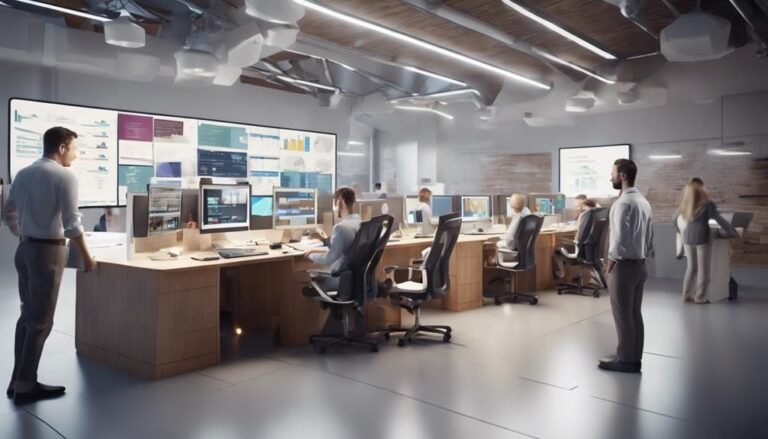Biotechnologist Job Description
Biotechnologists conduct research, analyze data, and innovate in healthcare, agriculture, and environmental sectors. Key responsibilities include conducting experiments, analyzing results, and problem-solving. Proficiency in lab techniques, data analysis, and communication is essential. The work environment emphasizes precision, lab safety, and collaboration with other scientists. Career growth opportunities include skill updates, advanced education, and leadership roles. With a projected 7% job growth, biotechnologists play an important role in advancing genetic engineering and pharmaceuticals. Competitive salaries and diverse industry opportunities make this field promising. For more details on educational background, work environment, and salary expectations, explore further.
Key Takeaways
- Biotechnologist certifications are essential for proficiency.
- Analyzing data to develop new products.
- Possessing problem-solving abilities and attention to detail.
- Opportunities for career growth and specialization.
- Conducting research and experiments.
Overview of Biotechnologist Role
What key responsibilities and skills define the role of a biotechnologist in the field of scientific research and development?
Biotechnologists play an important role in advancing scientific research and development within the biotech industry. To excel in this field, biotechnologist certifications are essential. These certifications, such as those in molecular biology techniques or bioprocessing, demonstrate proficiency in specialized areas and enhance credibility within the industry.
Keeping abreast of biotech industry trends is also crucial for biotechnologists. Staying informed about the latest technologies, research methods, and regulatory changes enables professionals to make informed decisions and drive innovation forward.
Biotechnologists must possess strong analytical skills to interpret complex data, attention to detail to ensure accuracy in experiments, and problem-solving abilities to overcome challenges in research projects. Additionally, effective communication skills are essential for collaborating with multidisciplinary teams and presenting findings to stakeholders.
Key Responsibilities
The key responsibilities of a biotechnologist encompass a range of job duties that involve conducting research, performing experiments, and analyzing data to develop new products or processes. In addition to technical skills, biotechnologists must possess strong problem-solving abilities, attention to detail, and effective communication skills to succeed in this field.
This role offers numerous opportunities for career growth, including specializing in specific areas of biotechnology, moving into management positions, or pursuing academic research.
Job Duties Overview
Examining the core functions of a biotechnologist role reveals a myriad of key responsibilities essential to the field's success.
- Utilizing advanced lab techniques and research methods to conduct experiments and analyze data effectively.
- Staying abreast of industry trends and technology advancements to incorporate the latest tools and methodologies into research projects.
- Designing experiments, developing protocols, and executing studies to achieve project objectives and timelines.
- Collaborating with cross-functional teams, presenting findings, and contributing to scientific discussions to drive innovation and problem-solving within the biotechnology sector.
These key responsibilities underscore the critical role that biotechnologists play in advancing scientific knowledge and technological applications in various industries.
Required Skills
In order to excel in the field of biotechnology, possessing a diverse set of required skills is crucial. Biotechnologists should be proficient in laboratory techniques and have significant research experience to conduct experiments effectively. Additionally, strong data analysis skills are essential for interpreting results accurately. Communication skills are crucial for presenting findings, collaborating with team members, and writing reports. Below is a breakdown of the key skills required for a successful biotechnologist:
| Laboratory Techniques | Research Experience | Data Analysis |
|---|---|---|
| Proficiency in various lab procedures | Conducting experiments | Analyzing complex data |
| Knowledge of equipment handling | Literature review | Statistical analysis |
| Attention to detail | Experimental design | Data interpretation |
| Communication Skills | ||
| Written and oral communication | ||
| Presentation skills | ||
| Team collaboration | ||
Career Growth Opportunities
To maximize career growth opportunities in biotechnology, it is essential for biotechnologists to consistently demonstrate proficiency in key responsibilities that encompass various aspects of research and development. Biotechnologists can enhance their career development and professional growth by:
- Continuously Updating Skills: Staying abreast of the latest technologies and methodologies is vital for career advancement.
- Seeking Advanced Education: Pursuing higher degrees or specialized certifications can open doors to more senior positions.
- Networking: Building a strong professional network within the biotech industry can lead to new opportunities and collaborations.
- Taking on Leadership Roles: Showing leadership qualities and taking charge of projects can demonstrate readiness for higher positions.
Required Skills
To excel as a biotechnologist, possessing essential biotech skills and key job qualifications is imperative. These requirements encompass a blend of technical expertise, analytical proficiency, and problem-solving capabilities.
Biotechnologists must showcase a strong grasp of scientific principles and the ability to apply them effectively in a research or industrial setting.
Essential Biotech Skills
An in-depth understanding of molecular biology techniques is fundamental for success in the field of biotechnology. To excel in this dynamic field, biotechnologists must possess a diverse set of essential skills, including:
- Proficiency in a wide range of lab techniques and research methods is essential for conducting experiments and analyzing data accurately.
- Strong knowledge of genetic engineering principles is necessary for manipulating organisms at the molecular level.
- Skilled in data analysis to interpret complex experimental results and draw meaningful conclusions.
- Ability to adapt quickly to new technologies and methodologies to stay at the forefront of biotechnological advancements.
These skills are important for biotechnologists to effectively contribute to research, development, and innovation in the biotechnology industry.
Key Job Qualifications
Having a complete set of important job qualifications is essential for individuals seeking success in the field of biotechnology. When considering key job qualifications, it is vital to look at the educational background and career outlook.
Biotechnologists typically hold a minimum of a bachelor's degree in biology, biotechnology, or a related field. Advanced degrees, such as a master's or Ph.D., can lead to higher salary expectations and more opportunities for career growth. Additionally, having a strong foundation in molecular biology, genetics, biochemistry, and laboratory techniques is fundamental.
The career outlook for biotechnologists is promising, with an increasing demand for professionals in this field due to advancements in biotechnology and the growing emphasis on healthcare and sustainability.
Educational Background
A solid educational foundation in biotechnology is essential for individuals pursuing a career in the field. Biotechnologists typically need a combination of formal education and practical experience to excel in this competitive industry. Here are four key aspects of the educational background required for a successful biotechnologist:
- Bachelor's Degree: A minimum requirement for most entry-level positions in biotechnology is a bachelor's degree in biotechnology, biology, biochemistry, or a related field. This provides a fundamental understanding of biological processes and laboratory techniques.
- Advanced Degrees: Pursuing a master's or Ph.D. in biotechnology or a specialized area within the field can open up more advanced career paths and research opportunities.
- Internships and Research Experience: Hands-on experience through internships, research assistantships, or co-op programs is highly beneficial. It provides practical skills and industry exposure.
- Continuing Education: Due to rapid advancements in biotechnology, staying updated on industry trends through workshops, conferences, and additional courses is important for career growth and remaining competitive in the field.
Work Environment
The work environment for biotechnologists is characterized by a dynamic and research-driven atmosphere that requires a high level of precision and attention to detail. Biotechnologists typically work in laboratories where they conduct experiments, analyze data, and develop new technologies. Lab safety is paramount in this environment, with strict protocols in place to guarantee the well-being of all personnel and the integrity of the research. Biotechnologists are also responsible for equipment maintenance to ensure accurate results and smooth operations.
Collaboration is a key aspect of the work environment for biotechnologists. They often work in teams with other researchers, scientists, and technicians to tackle complex problems and develop innovative solutions. This collaborative approach fosters creativity and allows for the exchange of ideas, ultimately leading to breakthroughs in biotechnology. Problem-solving skills are highly valued in this field, as biotechnologists must navigate challenges and overcome obstacles in their research endeavors. The work environment for biotechnologists is fast-paced, intellectually stimulating, and offers opportunities for professional growth and development.
Career Outlook
Examining the employment prospects for biotechnologists reveals a landscape rich with opportunities for those skilled in cutting-edge research and innovation. The job prospects for biotechnologists are promising, with a projected growth rate of 7% from 2020 to 2030, according to the Bureau of Labor Statistics. This growth is fueled by the increasing demand for advancements in healthcare, agriculture, and environmental preservation.
Here are four key factors contributing to the positive employment outlook for biotechnologists:
- Advancements in Technology: Constant developments in biotechnology require skilled professionals to drive innovation and research in areas such as genetic engineering and pharmaceuticals.
- Industry Diversity: Biotechnologists can find opportunities in various industries, including pharmaceuticals, food and agriculture, environmental conservation, and academic research.
- Global Market Expansion: The expanding global market for biotechnological products and services opens doors for biotechnologists to work on an international scale.
- Interdisciplinary Skills: Biotechnologists with interdisciplinary skills in areas like bioinformatics, data analysis, and regulatory affairs are highly sought after in the job market.
Salary Expectations
Analyze the remuneration structure to understand the financial implications of pursuing a career as a biotechnologist. Salary negotiations play a vital role in determining the compensation packages for professionals in this field. It is essential for biotechnologists to be aware of industry benchmarks to gauge their earning potential accurately.
Biotechnologists typically enjoy competitive salaries due to the specialized nature of their work. According to industry reports, the average annual salary for biotechnologists falls within a range that reflects the level of expertise and experience. Entry-level positions may offer salaries at the lower end of the spectrum, while senior biotechnologists with advanced degrees and significant experience can command higher pay rates.
When considering a career in biotechnology, individuals should factor in the potential for salary growth over time. With the industry's continuous advancements and increasing demand for skilled professionals, biotechnologists have opportunities to advance their careers and negotiate higher salaries. By staying informed about salary trends and actively participating in salary negotiations, biotechnologists can maximize their earning potential in this rewarding field.
Advancement Opportunities
How can biotechnologists strategically position themselves for career progression and increased responsibilities within the industry? Advancement opportunities in biotechnology are abundant for those willing to invest in their professional growth and skill development. Here are four key strategies to ponder:
- Continuous Education: Pursuing advanced degrees or certifications in specialized areas of biotechnology can open doors to higher-level positions and increased responsibilities.
- Networking: Building a strong professional network within the biotech industry can provide valuable connections for career advancement and potential job opportunities.
- Seeking Mentorship: Finding experienced mentors within the field can offer guidance, advice, and insights into charting the path to promotion opportunities.
- Proactive Approach: Taking on challenging projects, volunteering for leadership roles, and showing initiative in solving complex problems can demonstrate readiness for career progression and attract the attention of decision-makers.
Conclusion
To sum up, the biotechnologist role demands a diverse skill set and strong educational background.
The work environment is often fast-paced and demanding, but offers ample opportunities for career advancement.
With a positive outlook on the future of biotechnology, professionals can expect competitive salaries and a promising career trajectory.
Embracing the evolving landscape of biotechnology will lead to success in this field.







